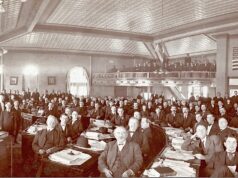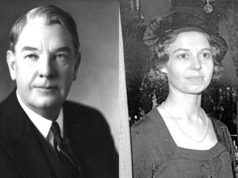
Every so often, American historians are polled by somebody or other (usually another American historian) to determine the “greatest” presidents of the United States. Andrew Jackson often makes the Top 10 or Top 20, and in the past he was often ranked first.
Current President Donald Trump famously admires Andrew Jackson. Lest we forget, Old Hickory was responsible for the Indian Removal Act, which was signed 189 years ago this week. Its result turned Indian Territory into a vast concentration camp. The cynic might suggest that Trump would like to turn the entire Southwest into a vast concentration camp, not for Native Americans but for Hispanics.
Trump apparently admires Andrew Jackson so much that his toady, U.S. Secretary of Treasury Steve Mnuchin, is reportedly loathe to take the seventh president off the $20 bill and replace him with Harriet Tubman, the Maryland-born abolitionist who helped free other escaped slaves via the Underground Railroad. Mnuchin said recently he would delay replacing Jackson with Tubman until after Trump leaves office, so as to prevent the orange-crested POTUS from putting the kibosh on the entire change.
The currency change would appear to bother Trump because — owing to numerous comments and actions — many of us are left to believe Trump does not like women or people of color. I would say anybody who thinks otherwise ain’t been paying attention. So, expect Jackson on your $20 bills until, say, the mid-to-late 2020s.
Andrew Jackson did whatever the hell he pleased
But back to those historians for a moment. Why does Andrew Jackson sometimes rate the top spot among American presidents? Because, they say, he did more to expand the power of the presidency than anyone else. What they generally do not emphasize is that he did it by ignoring the U.S. Constitution and doing whatever the hell he pleased.
When Chief Justice of the Supreme Court John Marshall ruled in Worcester v. Georgia that Jackson couldn’t have his way with Native Americans, Jackson replied that John Marshall had made his decision and now he could try to enforce it. To that extent, we know that Jackson understood at least a part of the Constitution: The executive branch has the coercive power in government (military force), and the Supreme Court has none.
In essence, Jackson was saying he had no intention of obeying the part of the Constitution stating that much of his responsibility was to enforce the laws of the United States.
So it’s no wonder Donald Trump admires Andrew Jackson. The man did as he pleased, without restriction or oversight, and so does The Donald. Everybody who opposed Jackson simply wasn’t re-elected. Consider David Crockett of Tennessee: A one-term congressman because he opposed the Indian Removal Act.
Perchance that would help us understand the silence of our own Oklahoma congressional delegation, regardless of Trump’s provocation. Politics in Oklahoma is a career choice, and you don’t want to jeopardize your career, do you Markwayne, Kevin, James, et al?




















